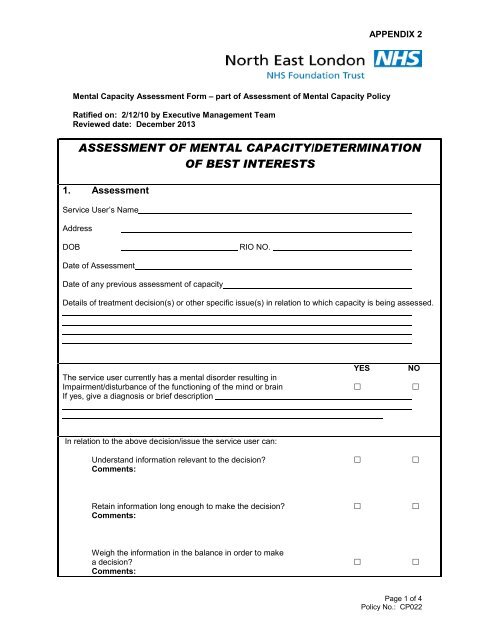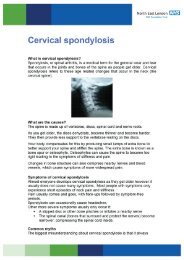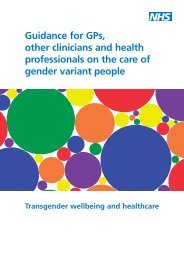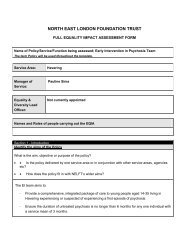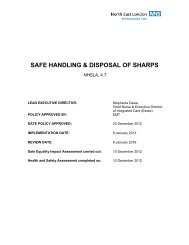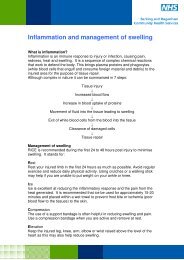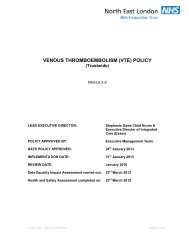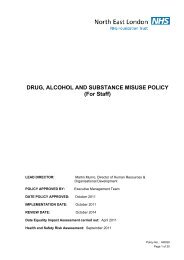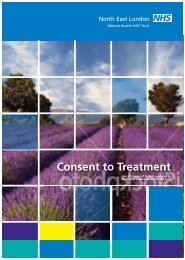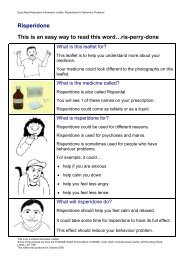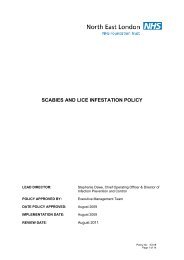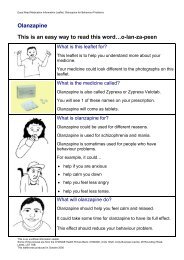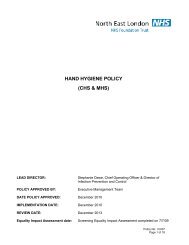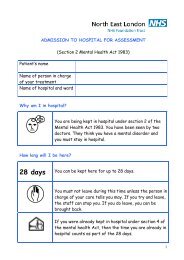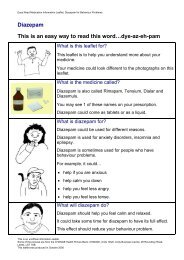Assessment Form for Assessing Mental Capacity
Assessment Form for Assessing Mental Capacity
Assessment Form for Assessing Mental Capacity
Create successful ePaper yourself
Turn your PDF publications into a flip-book with our unique Google optimized e-Paper software.
APPENDIX 2<br />
<strong>Mental</strong> <strong>Capacity</strong> <strong>Assessment</strong> <strong>Form</strong> – part of <strong>Assessment</strong> of <strong>Mental</strong> <strong>Capacity</strong> Policy<br />
Ratified on: 2/12/10 by Executive Management Team<br />
Reviewed date: December 2013<br />
ASSESSMENT OF MENTAL CAPACITY/DETERMINATION<br />
OF BEST INTERESTS<br />
1. <strong>Assessment</strong><br />
Service User’s Name<br />
Address<br />
DOB RIO NO.<br />
Date of <strong>Assessment</strong><br />
Date of any previous assessment of capacity<br />
Details of treatment decision(s) or other specific issue(s) in relation to which capacity is being assessed.<br />
YES NO<br />
The service user currently has a mental disorder resulting in<br />
Impairment/disturbance of the functioning of the mind or brain <br />
If yes, give a diagnosis or brief description<br />
In relation to the above decision/issue the service user can:<br />
Understand in<strong>for</strong>mation relevant to the decision <br />
Comments:<br />
Retain in<strong>for</strong>mation long enough to make the decision <br />
Comments:<br />
Weigh the in<strong>for</strong>mation in the balance in order to make<br />
a decision <br />
Comments:<br />
Page 1 of 4<br />
Policy No.: CP022
Communicate the decision <br />
Comments:<br />
Note that if the service user fails the test at any point, they lack capacity in relation to the<br />
decision at the time of the assessment.<br />
YES NO<br />
Is the service user likely to recover capacity <br />
If yes, the assessment of capacity should be repeated at a future point.<br />
Suggested time-interval be<strong>for</strong>e further assessment required<br />
2. Referral to IMCA<br />
YES<br />
NO<br />
Is the patient eligible to be referred to an IMCA <br />
If yes, has the patient been referred <br />
If yes, date<br />
and name of IMCA Service<br />
Page 2 of 4<br />
Policy No.: CP022
3. Determination of Best Interests<br />
If the outcome of the assessment is that the service user lacks capacity, it may be possible to treat/act in<br />
their best interests. To help determine this,<br />
YES<br />
NO<br />
Have the service user’s past and present wishes and<br />
feelings been taken into account as far as possible <br />
Has account been taken of the service user’s known<br />
beliefs and values <br />
Have the service user’s relatives/friends been consulted <br />
Is there any IMCA/other advocate. <br />
If yes, have their views been taken into account <br />
If there is an advance decision/lasting Power of<br />
Attorney/deputy appointed by the Court of Protection,<br />
have they been consulted <br />
Is the person subject to a DoLs authorisation <br />
Proposed course of action and reasons.<br />
Completed by:<br />
Name: Position:<br />
Date:<br />
Page 3 of 4<br />
Policy No.: CP022
SUMMARY OF STEPS IN ASSESSING MENTAL CAPACITY<br />
APPENDIX 3<br />
<strong>Capacity</strong> should be judged in relation to a specific decision – some decisions are easier to make<br />
than others.<br />
A mentally competent adult has an absolute right to refuse to consent to any intervention or medical<br />
treatment <strong>for</strong> a physical condition <strong>for</strong> any reason, rational or irrational, or <strong>for</strong> no reason at all, even<br />
where this decision may lead to his or her own death.<br />
PRINCIPLES OF ASSESSING MENTAL CAPACITY<br />
<br />
<br />
<br />
<br />
<br />
A person must be assumed to have capacity unless it is established that he or she lacks capacity.<br />
A person is not to be treated as unable to make a decision unless all practicable steps to help him<br />
or her to do so have been taken without success.<br />
A person is not to be treated as unable to make a decision merely because he or she makes a<br />
decision that others believe to be unwise.<br />
An act done, or decision made, <strong>for</strong> or on behalf of a person who lacks capacity must be done, or<br />
made, in his or her best interests.<br />
Be<strong>for</strong>e such an act is done, or decision made, regard must be had to whether the purpose <strong>for</strong><br />
which it is needed can be as effectively achieved in a way that is less invasive or restrictive of the<br />
person’s rights and freedom of action.<br />
DEMONSTRATING DECISION-MAKING CAPACITY<br />
In order to demonstrate decision making capacity, a person should be able to: -<br />
<br />
<br />
<br />
<br />
Understand the in<strong>for</strong>mation relevant to the decision, including the purpose of any proposed course<br />
of action, the main benefits, risks and alternatives, and the consequences of refusing to follow the<br />
proposed course of action and of failing to make a decision.<br />
Retain that in<strong>for</strong>mation <strong>for</strong> long enough to make a decision.<br />
Use or weigh that in<strong>for</strong>mation as part of the process of making the decision.<br />
Communicate his or her decision, whether by speech, sign language or any other means.<br />
A person who fails any one of the above four points is lacking in capacity in relation to that decision.<br />
DETERMINING AN INDIVIDUAL’S BEST INTERESTS<br />
In determining what is in a person’s best interests, regard should be had to medical and welfare issues, but<br />
also to the religious, cultural and ethical principles of the person. The following must be considered: -<br />
<br />
<br />
<br />
<br />
<br />
<br />
<br />
Whether the person is likely, at some point in the future, to recover his or her decision-making<br />
capacity in relation to the matter in question.<br />
The ascertainable past and present wishes and feelings of the person, and the beliefs, values and<br />
other factors that would be likely to influence him or her if he or she had capacity.<br />
The need to allow and encourage the person to participate as fully as possible in any act done <strong>for</strong>,<br />
and any decision affecting, him or her.<br />
The views of relatives, carers or other people involved whom it is appropriate and practicable to<br />
consult about the person’s wishes and feelings, and what would be in his or her best interests.<br />
Whether the purpose <strong>for</strong> which any action or decision is required can be as effectively achieved in<br />
a manner less invasive or restrictive of the person’s freedom of action.<br />
In the case of a medical treatment, that treatment should be necessary to save life, prevent a<br />
deterioration or ensure an improvement in the patient’s physical or mental health and should be<br />
consistent with a reasonable body of current medical opinion (the “Bolam” test).<br />
The views of an IMCA/other advocate if appointed.<br />
Page 4 of 4<br />
Policy No.: CP022


